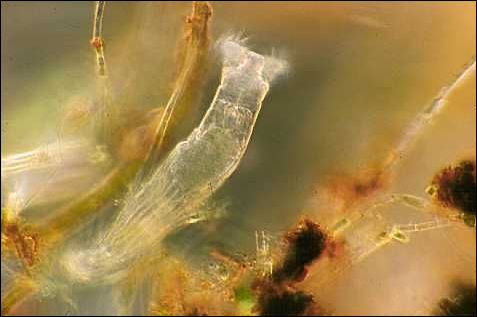

We hear a lot about clones these days. As most people know, a clone has the same genetic makeup as the individual it was derived from. There are lots of clones in nature, plants and animals reproducing without sex, creating new individuals that are an exact copy of the parent. Many of our varieties of domestic fruits, for example, are reproduced vegetatively, all the trees being clones. This is necessary because sexual reproduction mixes up the male and female genes as well as scrambling the relationships of the genes within an individual.
From the viewpoint of evolution, this trying out of various
combinations of genes tends to preserve the better assortments while mercilessly
destroying the worst. All of this makes one group of almost microscopically small
rotifers strange; no males have ever been found. Most obligately asexual animals become
extinct through time, but not the bdelloid rotifers. There's at least a suggestion
that this group of species may have gone without sex for some 50 million years; and
what's more amazing, we've never found a clinically depressed rotifer!

Listen to the Audio (mp3 format) as recorded by KTEP, Public Radio for the Southwest.
Contributor: Arthur H. Harris, Laboratory for Environmental Biology, Centennial Museum, University of Texas at El Paso.
Desert Diary is a joint production of the Centennial Museum and KTEP National Public Radio at the University of Texas at El Paso.

The rotifer Habrotrocha feeding. Image courtesy of © www.micrographia.com.
www.micrographia.com: A wide variety of mostly freshwater microscopic organisms, including Bdelloid rotifers.